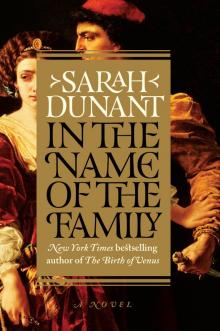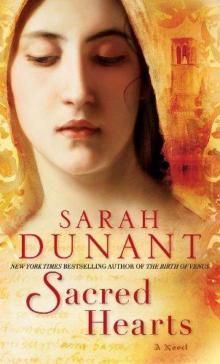- Home
- Sarah Dunant
In the Name of the Family
In the Name of the Family Read online
In the Name of the Family is a work of fiction. Names, characters, places, and incidents are the product of the author’s imagination or are used fictitiously. Any resemblance to actual events, locales, or persons, living or dead, is entirely coincidental.
Copyright © 2017 by Sarah Dunant
All rights reserved.
Published in the United States by Random House, an imprint and division of Penguin Random House LLC, New York.
RANDOM HOUSE and the HOUSE colophon are registered trademarks of Penguin Random House LLC.
Library of Congress Cataloging-in-Publication Data
Names: Dunant, Sarah, author.
Title: In the name of the family : a novel / Sarah Dunant.
Description: First edition. | New York : Random House, [2017]
Identifiers: LCCN 2016025060| ISBN 9780812996975 | ISBN 9780812996982 (ebook)
Subjects: LCSH: Borgia family—Fiction. | Nobility—Papal states—Fiction. | Italy—History—1492–1559—Fiction. | Rome (Italy)—History—1420–1798—Fiction. | GSAFD: Biographical fiction. | Historical fiction.
Classification: LCC PR6054.U45756 I53 2017 | DDC 823/.914—dc23 LC record available at https://lccn.loc.gov/2016025060
Ebook ISBN 9780812996982
randomhousebooks.com
Book design by Liz Cosgrove, adapted for ebook
Cover design: Roberto de Vicq de Cumptich
Cover painting: Alfred W. Elmore, Lucrezia Borgia, 1863
(photo © Christie’s Images/Bridgeman Images)
v4.1
ep
Contents
Cover
Title Page
Copyright
Epigraph
Prologue
Winter
Chapter 1
Chapter 2
Chapter 3
Chapter 4
Chapter 5
Chapter 6
Chapter 7
Spring
Chapter 8
Chapter 9
Chapter 10
Chapter 11
Chapter 12
Chapter 13
Chapter 14
Summer
Chapter 15
Chapter 16
Chapter 17
Chapter 18
Chapter 19
Chapter 20
Autumn–Winter
Chapter 21
Chapter 22
Chapter 23
Chapter 24
Chapter 25
Chapter 26
Chapter 27
Chapter 28
Chapter 29
Winter–Spring
Chapter 30
Chapter 31
Chapter 32
Chapter 33
Chapter 34
Chapter 35
Chapter 36
Chapter 37
Chapter 38
Chapter 39
Summer
Chapter 40
Chapter 41
Chapter 42
Chapter 43
Chapter 44
Chapter 45
Chapter 46
Ten Years Later
Epilogue
Historical Note
Dedication
Acknowledgments
Bibliography
By Sarah Dunant
About the Author
…As an eagle may fly carrying a tortoise in his mouth, then drop it to the ground so that the fall smashes open its shell…
—Niccolò Machiavelli on the vagaries of fortune
Prologue
FLORENCE, JANUARY 1502
You couldn’t call him tall; he was barely an inch bigger than her and wiry in stature. His soot black hair was cut unfashionably close to his head, and his face, broad at the eyes, tapered via a thin nose to a sharp clean-shaven chin. The word weasel had come to mind when they first met. But strangely it hadn’t put her off. Marietta Corsini had known already that her future husband was clever (he had a job in government and everyone knew men like that needed a wheelbarrow to carry their thoughts), and within a few minutes he had made her laugh. He had also made her blush, for there had been something in his bright-eyed concentration, his almost animal quiver energy that seemed to be half undressing her. By the time they had said their goodbyes she was smitten, and six months of marriage has done nothing to change that.
He leaves for work each day at dawn. In the beginning she had hoped that her nest-ripe body might tempt him to linger. The city is rife with stories of married men who use early risings as excuses to visit their mistresses, and he had come with a reputation for enjoying life. But even if that were the case, there’s nothing she can do about it, not least because wherever he is going, this husband of hers, he has already “gone” from her long before he gets out of the door.
In fact, Niccolò Machiavelli doesn’t leave the warmth of his marriage bed for any other woman (he can do that easily enough on his way home), but because the day’s dispatches arrive at the Palazzo della Signoria early and it is his greatest pleasure as well as his duty to be among the first to read them.
His journey takes him down Via Guicciardini on the south side of the city and across the river Arno via the Ponte Vecchio. A maverick winter snowfall has turned into a grimy frost and the ground cracks like small animal bones under his feet. On the bridge fresh carcasses are being unloaded into the butchers’ shops. Through their open shutters he catches glimpses of the river, its surface of the water a silvery apricot under the rising sun. A feral dog streaks across his path, going for a gobbet of offal near the wheel of a cart. It earns him a kick in the ribs for his daring but his jaws remain firmly clenched over the prize. Scavenging opportunist, Niccolò thinks, not without a certain admiration. Stick a feathered hat on him and give him a sword and you’ve got half the country. How long ago was that business in the city of Fermo? Christmas, yes? He’d opened the dispatch himself: the duke’s “loving” nephew had invited his uncle to a seasonal dinner, then locked the doors and slaughtered him and his entire council, taking the title for himself. In the chancery, his staff were laying bets on how long it would be before the next murderous dinner invite, but Niccolò’s money is on the usurper. While the man may be a thug, he’s also a mercenary leader in Cesare Borgia’s army, which makes him a thug with powerful allies.
Across the bridge, he passes by the side of San Pier Scheraggio church out into the open space of the Piazza della Signoria, dominated by the handsome crenellated palace of government. To the left of the main doors is a weathered bronze statue; the figure of Judith, calm, concentrated, a raised sword in her right hand poised to slice through the neck of Holofernes, who sits painfully twisted at her feet. Niccolò gives her a silent salute. He knows men in government who find it unnerving to be greeted daily by the sight of a woman administering justice to a man, but they are missing the point. Donatello’s statue, plundered from the Medici palace and placed here eight years before, stands as a deliberate reminder to the republic of Florence that she would never again allow the dictatorship of a single family.
Alas, the gap between the ideal and reality in politics is enough to give most men vertigo. If Judith were to lift up her eyes now, she would be looking at the place in the piazza where they had burned the Dominican friar Savonarola, whose fanatical devotion to God’s laws had made him another kind of tyrant. Every time he passes a tavern where some idiot cook has burned a carcass on a spit, the sick-sweet smell of caramelized fat and flesh has him back inside the crowd, straining to see the stake over the shoulders of bigger men. He had never witnessed a public burning before—Florence has little fondness for such barbarity—and Savonarola had been garroted before the faggots were lit, but the spectacle, and the stench, had still tu
rned his stomach.
He’d known then that Florence had a challenge ahead of her, reestablishing a working republic after so much madness. And if he is confident in public—for that is his job—in private he has grave doubts.
He slips into the palazzo through a side entrance, exchanging a joke with a sleepy guard, before climbing a spiral staircase that takes him through the great central hall, up a further flight into the council rooms and offices above. His desk is in a small antechamber set off from the main salon, with its gilded wooden ceiling and patterned fleur-de-lis walls. The temperature is almost as cold inside as out. When the elected members gather there will be braziers and fires lit, but as a hired hand he has his own clay bottle and must send out for regular refills to stop his feet from turning to ice. He will do it later: once the seals on the day’s dispatches are broken he won’t feel the cold.
It is Niccolò’s business, as head of the second chancery and secretary to the Council of Ten for Liberty and Peace, to keep abreast of every shift and change in the political landscape of the country. For as long as he can remember such things have fascinated him. He was barely thirteen years old when his father had placed a newly printed copy of Livy’s history of Rome in front of him, and like every first great love affair, it has colored the way he sees the world ever since.
“This is the most treasured possession this house now holds, you hear me?” Such dry humor his father practiced. “In a fire you had better took to yourself, for this will be the man I save first.”
He wonders sometimes what the great Livy would make of this modern Italy. In his own mind he sees the peninsula as a great ragged boot hanging off the Alps, the leather mottled and discolored by the vicissitudes of history. In the north, for the second time in a decade, a French army is in occupation, ruling Milan and overshadowing a dozen smaller states close by. On the Adriatic coast, Venice is puffed up with her own wealth and battles with the Turks, while the wild lands of the south are under the control of the Spanish, with a few old French strongholds inside.
But it is what is happening in the middle that would have surely fascinated Livy the most.
The speed and ferocity of the rise of the Borgia family have taken everyone by surprise. Of course Rome has had unscrupulous popes before, men who quietly favored the fortunes of their “nephews” or “nieces.” But this, this is different. Here is a pope, Alexander VI, who openly acknowledges and uses his illegitimate children as weapons to create a new dynastic power block; his eldest son Cesare, once a cardinal, marches at the head of a mercenary army conquering a line of city-states historically owned by the Church, while his daughter, Lucrezia, is the family’s prize marriage pawn.
Two of the day’s dispatches bring further news of the Borgia project. Lucrezia is now halfway across Italy with an entourage the size of a small army en route to her third husband, the Duke elect of Ferrara. Meanwhile, the Pope and his son, on a lap of honor to celebrate their latest conquest—the state of Piombino and the island of Elba—are making an early departure by boat back to Rome. How long till they arrive? If the wind obliges, the water will carry them faster than any road in winter, though it’s not a journey that he himself would choose to make. At least the rest of Tuscany will breathe easily for a while; a soldier at sea cannot be a duke leading an army on land.
He is filleting the dispatches ready for the council morning briefing when he hears the sounds of the great bells from the Cathedral of Santa Maria del Fiore marking the starting hour of the day. His thoughts move briefly to the cathedral workshop where the Florentine sculptor Michelangelo Buonarroti has spent the last nine months chiseling into a block of flawed marble, commissioned by the state to produce a great statue of David to be placed on the façade of the cathedral. No one has been allowed near the work, but the leaked gossip talks more of its emerging size than its beauty. It remains to be seen whether it will be powerful enough to shield the city from the Borgia Goliath.
As the last chimes die away, a series of contorted male shrieks rise up from somewhere nearby; a late coupling between the sheets or a few early knife thrusts into a belly? He smiles. Such are the sounds of his beloved city, the sounds indeed of the whole of Italy.
WINTER
1501–1502
There is no outrage or crime that is not openly practiced in the Vatican Palace. The Borgia Pope is an abyss of vice, a subverter of all justice….All fear him and his son Cesare, who from being a cardinal has made himself into an assassin and at whose orders men are killed, thrown into the Tiber and despoiled of all possessions.
—Anonymous letter circulated in Rome December 1501
CHAPTER 1
It is late afternoon and papal galleys are becalmed under a scrubbed blue sky. They had left Piombino with the dawn, pushed on by a temperamental wind that changed its mind too often for comfort, until it deserted them entirely, leaving them to drift like dreamers rocked on a gentle sea. To starboard, the Tuscan coast is a thick charcoal line on the horizon. The two vessels are separated by a hundred yards, Pope Alexander behind, Cesare, Duke Valentine, in front.
Despite the cold, Alexander, swaddled in furs on deck, is greatly enjoying himself. A magnificent trip this has been, a pope embraced by his people, from hermit monks with stinking breath to hosts of pretty women eager to kiss his robes and hang on his every word. He could happily have stayed longer, but Cesare, as ever, is pushing the pace. Alexander would relish another sunset over the water, though it could scarcely rival the one that had accompanied them into Piombino harbor five days before. Despite a lifetime in ill-lit rooms thrashing out Church politics, this bear of a man still has wonder in him when it comes to nature and had watched entranced as the sun descended slowly into the sea, like a giant red-hot metal disc pulled by some powerful lodestone beneath the surface. Such delight he had felt at his own flourish of poetry! He should leave Rome more often. Even the Prince of Christendom deserves a little leisure amid the burden of work.
On the galley in front, Cesare is less even-tempered. Italy’s most feared warrior is not at his best on water. When the weather is benign he is uncomfortable with the infinity of emptiness, and when the wind rises, slicing the sea and making the deck lurch beneath his feet, his stomach lurches with it. To be at the mercy of his own gut is a humiliation that can easily shade into aggression. What he needs is a little danger to get his nerves singing louder than his innards.
He crosses to the port deck, where the captain is standing, studying the western sky. He places himself next to the man, bracing his legs and resting one hand on the rail in unconscious imitation. “What do you see out there?”
“Nothing, my lord. Only weather.” Burned bronze with a bush of black curls, the man looks as if he has been hewn out of a trunk of Indian ebony. If it wasn’t for the papal insignia on his back, one might take him for some kind of infidel.
“What weather? There is none. If it stays this calm we will be stranded here all night. Why aren’t we using the oars still?”
“The oarsmen are tired. They need a rest,” the captain says, his eyes never wavering from the horizon.
The air is still, not even a hint of breeze. Apart from the lazy slap of water against wood, it feels as if the world has stopped moving. Cesare falls silent, squinting out into an endless nothing. His only experience of such stillness is the anticipation on a battlefield before the first cannons are fired. Could it be that there are sails somewhere out there, just beyond his eye’s reach? Is that what the captain is seeing?
These last days his thoughts have been running on piracy. Stories of how the citizens of his new state of Piombino and the island of Elba live in constant fear of attack from infidels, descending out of a clear sea, overrunning villages, slaughtering the men and carrying the screaming women and children back to their ships. Years later one might hear of children taken in this manner coming up for sale at the slave market in Venice and finding their way into a house where, through the mist of time, they would recognize the lilt of a mother�
��s lullaby or words of the Lord’s Prayer, though by then they worship only heathen gods. At this point in the retelling, his father’s eyes had been glistening with pity. Cesare, in contrast, had been boiling with fantasies of revenge.
My God, how he would like to take them on. To slice open their pagan Turkish bellies and set fire to their sails halfway to Constantinople. If their galleys were to appear on the horizon now, they would see what even a handful of Christian warriors could do. He has already studied the guns mounted on the hull, knows their range and capacity, and has quizzed the crewmen on the business of aiming over water. He would like to see the damage done when a cannonball rips through a wooden hull. Had not his namesake Caesar taken on a whole Egyptian fleet and sunk it into the depths? Or was that Emperor Augustus? Recently his grasp of history is becoming blurred inside the accelerated creation of his own myth.
“Do pirates sail this far south?”
“We are in no danger, Duke Valentine. The papal galleys are built to outrun anything on the sea if the men put their backs to it.”
“We wouldn’t stand and fight?”
“No.”
“Afraid of a few infidels?”
“Fear is not the issue, my lord,” he says evenly. A ship’s captain shares command with no one, and he is finding it hard to conceal his dislike for this young papal bastard who thinks he knows better than everyone around him. “It is the value of the cargo we are carrying.”

 Mapping the Edge
Mapping the Edge The Birth of Venus
The Birth of Venus In the Name of the Family
In the Name of the Family Snowstorms in a Hot Climate
Snowstorms in a Hot Climate In the Company of the Courtesan
In the Company of the Courtesan Birth Marks
Birth Marks Transgressions
Transgressions Under My Skin
Under My Skin Blood & Beauty: A Novel of the Borgias
Blood & Beauty: A Novel of the Borgias Blood & Beauty
Blood & Beauty Sacred Hearts
Sacred Hearts In the Company of the Courtesan: A Novel
In the Company of the Courtesan: A Novel